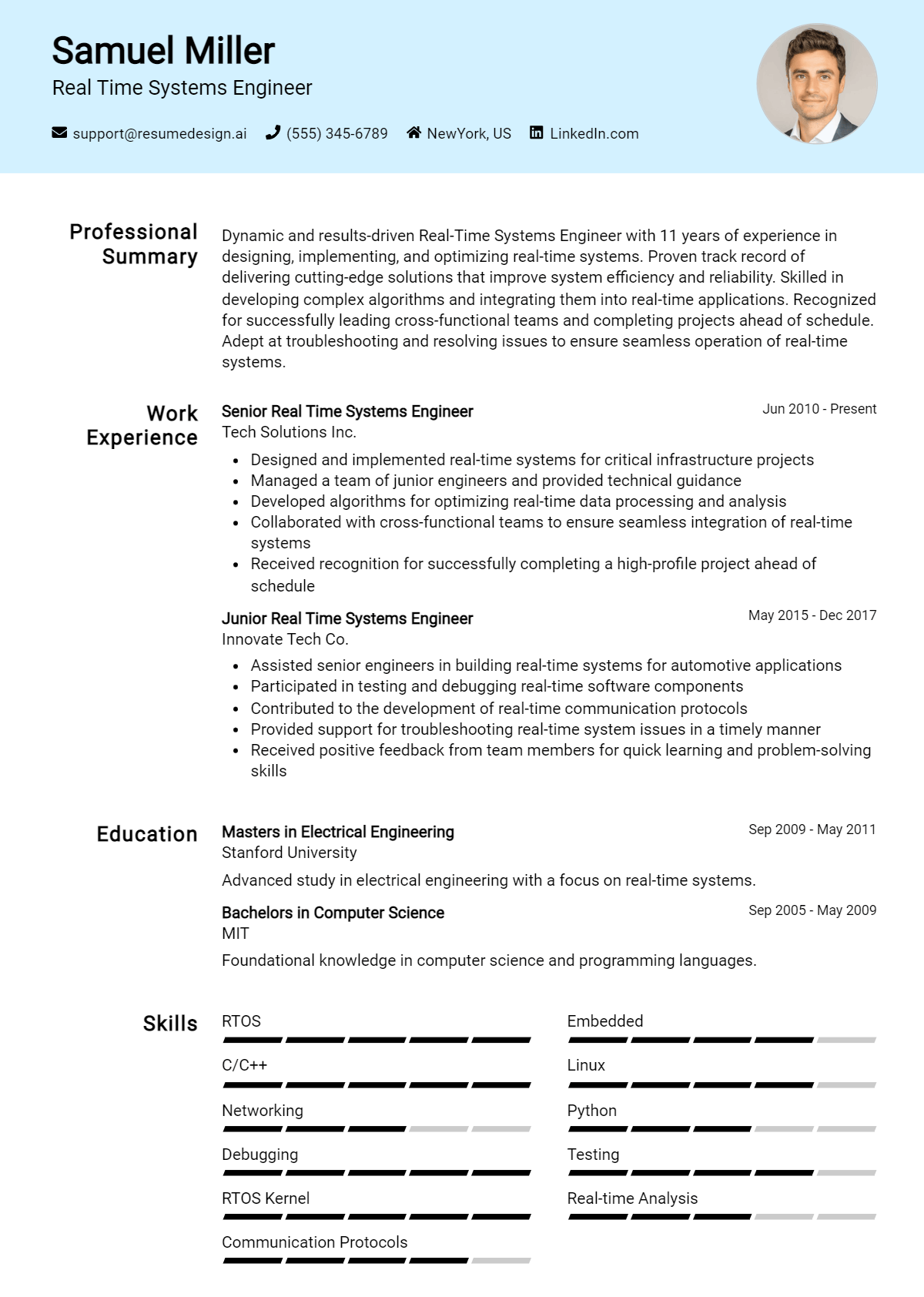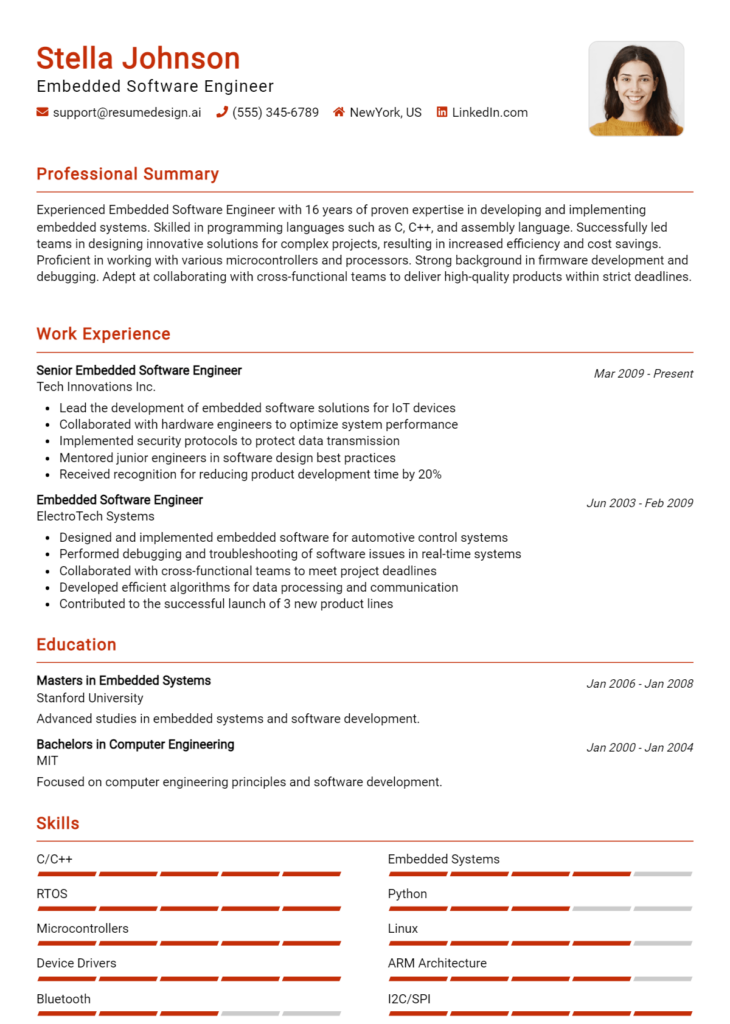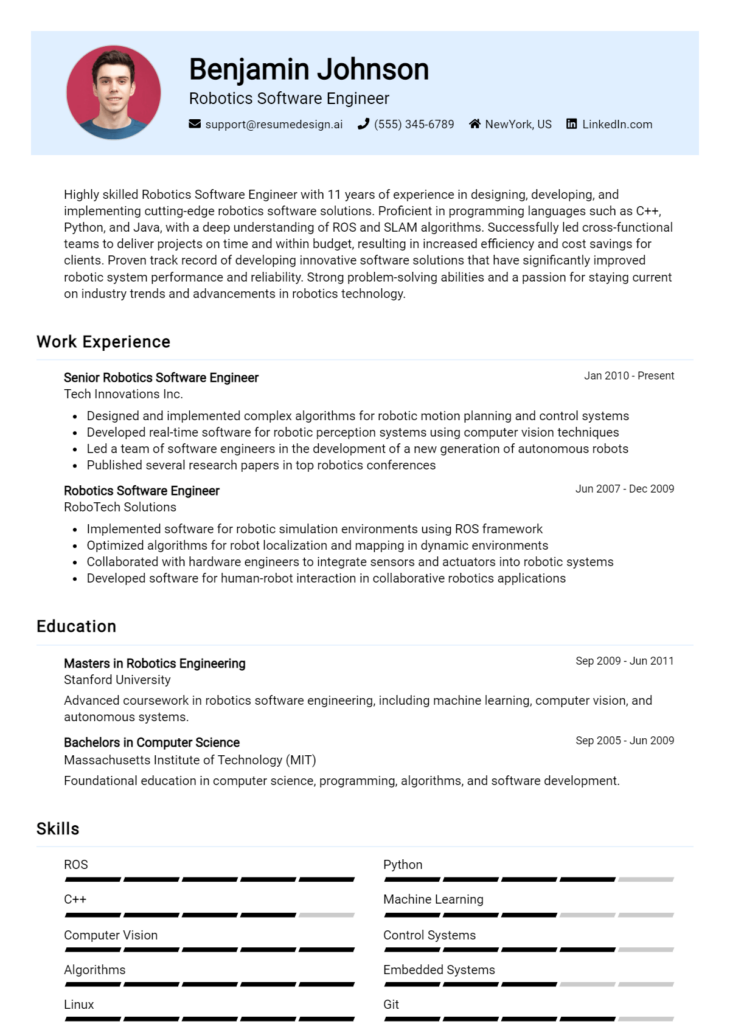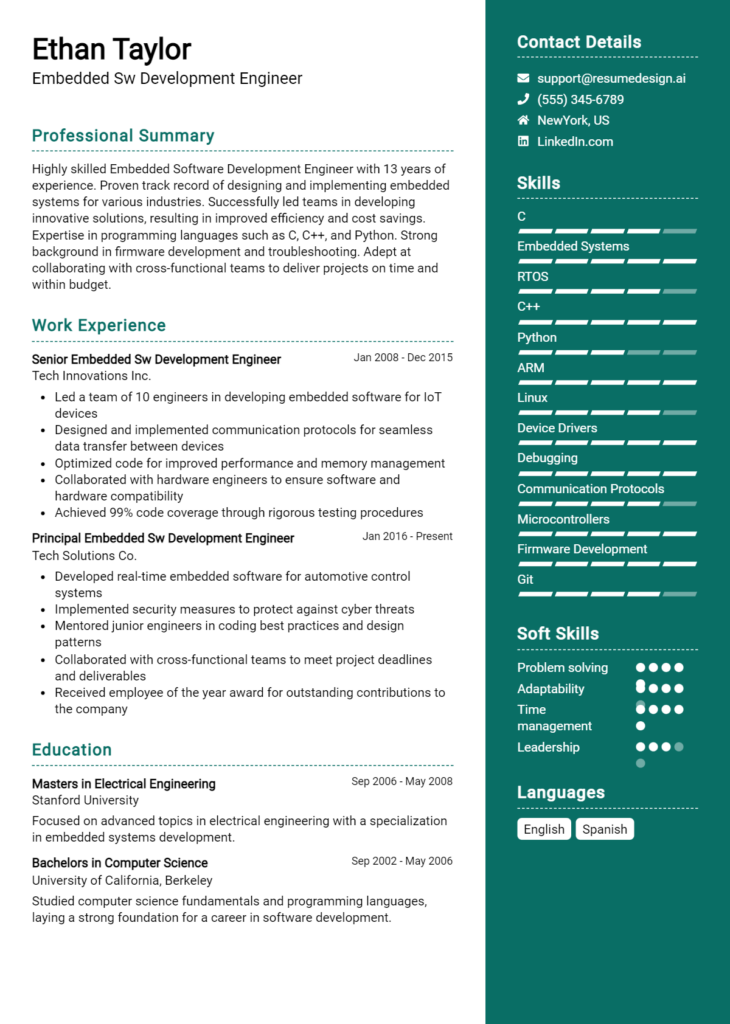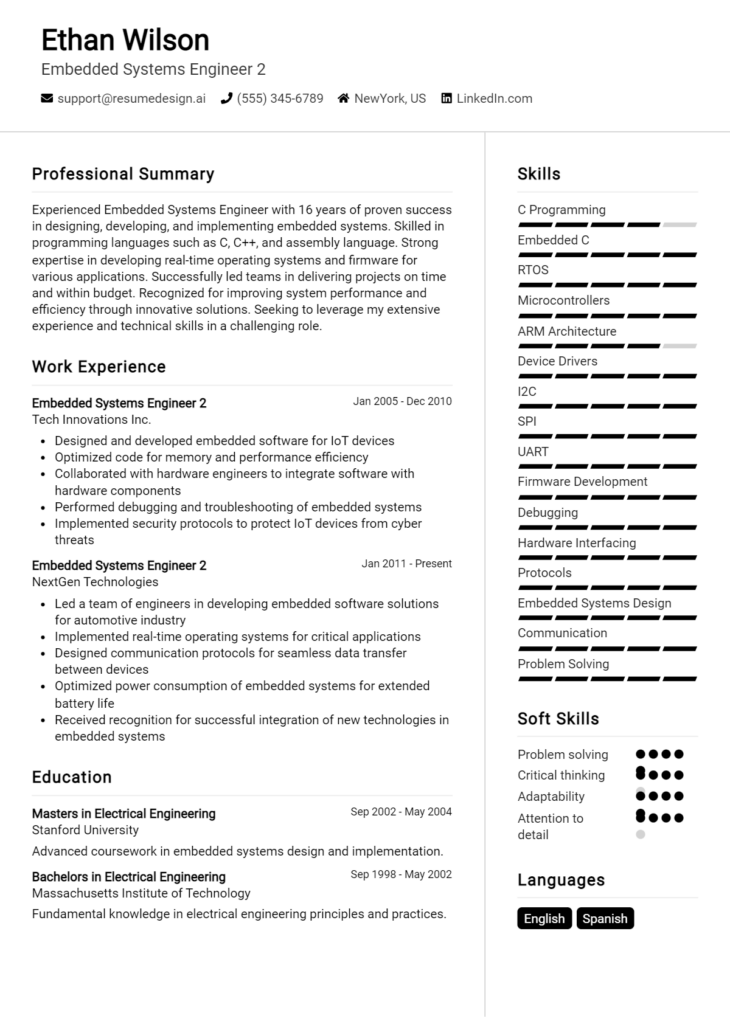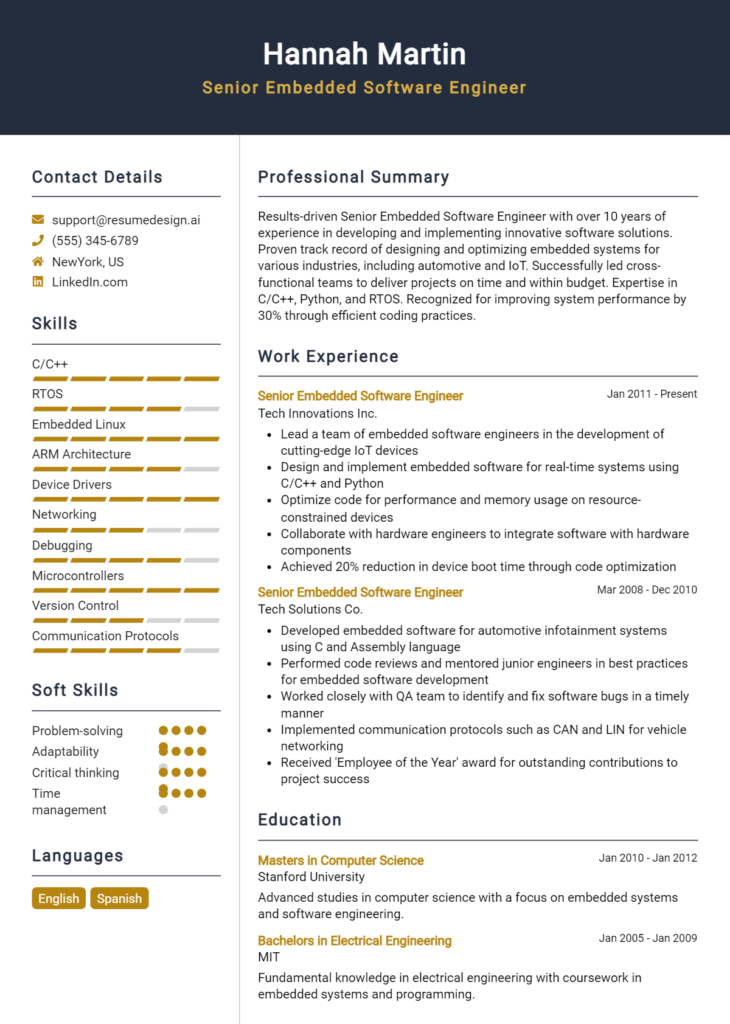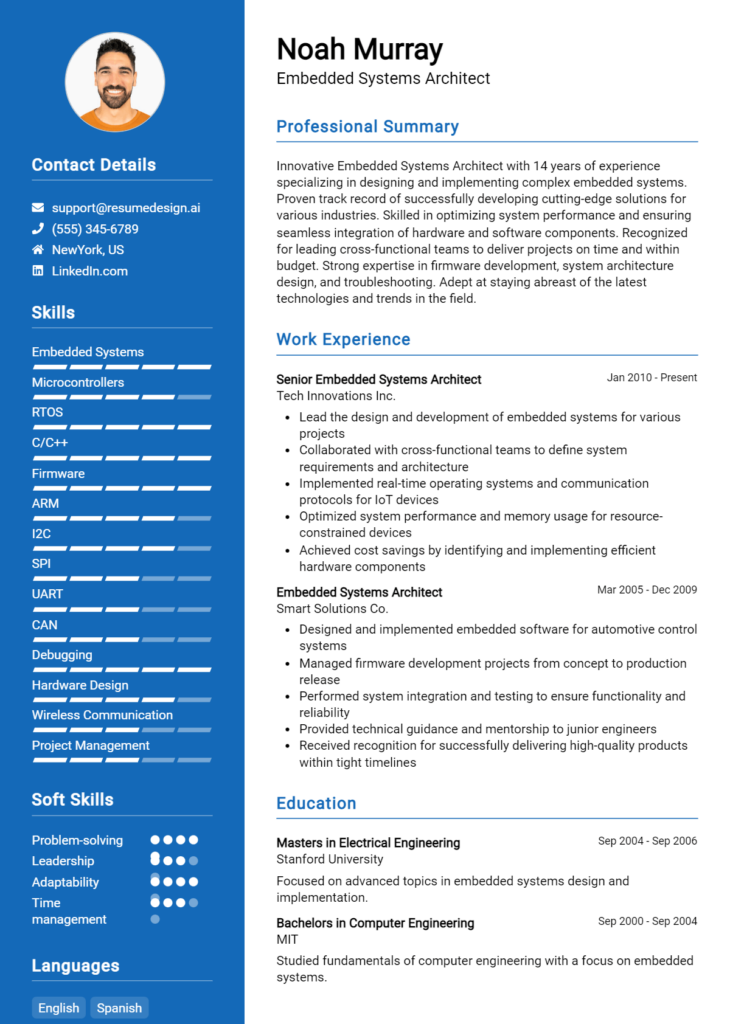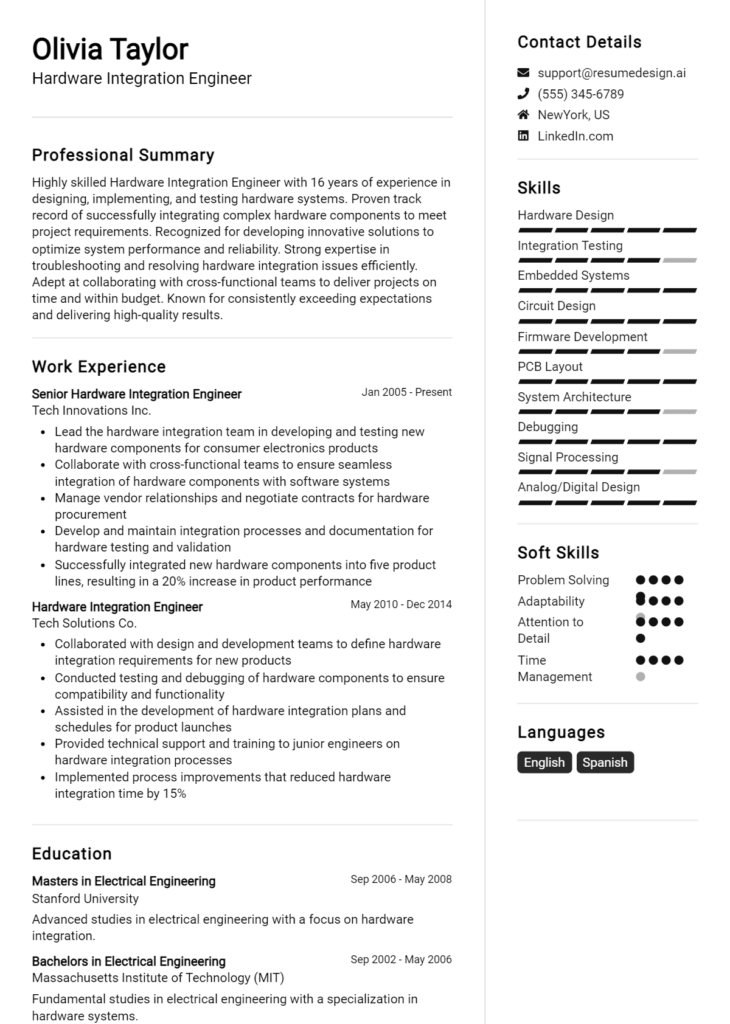Real-Time Systems Engineer Core Responsibilities
A Real-Time Systems Engineer plays a pivotal role in seamlessly integrating technical systems with operational needs. Key responsibilities include designing and implementing real-time software systems, collaborating with cross-functional teams such as hardware engineers and software developers, and conducting system performance analysis. Essential skills involve strong problem-solving abilities, proficiency in programming languages, and a thorough understanding of system architecture. These competencies are crucial for achieving organizational objectives, and a well-structured resume can effectively highlight these qualifications to prospective employers.
Common Responsibilities Listed on Real-Time Systems Engineer Resume
- Design and develop real-time embedded systems and applications.
- Collaborate with hardware and software teams to ensure system compatibility.
- Conduct performance analysis and optimization of real-time systems.
- Implement and maintain software development life cycle processes.
- Troubleshoot and resolve system issues efficiently.
- Document system architecture, design specifications, and test plans.
- Participate in code reviews to ensure quality and compliance.
- Stay updated with industry trends and emerging technologies.
- Provide technical support and training to team members.
- Develop and execute test cases for system validation.
- Manage project timelines and deliverables in cross-functional projects.
- Engage in continuous improvement initiatives to enhance system performance.
High-Level Resume Tips for Real-Time Systems Engineer Professionals
In the competitive field of Real-Time Systems Engineering, a well-crafted resume is your first opportunity to make a lasting impression on potential employers. Your resume serves as a powerful marketing tool that encapsulates your skills, experiences, and achievements, providing a snapshot of your professional journey. Given the technical nature of this role, it's essential that your resume not only highlights your engineering expertise but also conveys your ability to solve complex problems in real-time environments. This guide will provide practical and actionable resume tips specifically tailored for Real-Time Systems Engineer professionals, helping you effectively communicate your qualifications and stand out in a crowded job market.
Top Resume Tips for Real-Time Systems Engineer Professionals
- Tailor your resume for each job application by aligning your skills and experiences with the specific requirements outlined in the job description.
- Highlight relevant experience in real-time systems, including projects that demonstrate your understanding of timing constraints and system performance.
- Quantify your achievements where possible; for example, mention how you improved system response time by a certain percentage or reduced latency in a project.
- Showcase your knowledge of industry-specific tools and technologies, such as RTOS (Real-Time Operating Systems), embedded systems, and programming languages like C/C++ or Ada.
- Include certifications or training in relevant areas, such as safety-critical systems, real-time programming, or system architecture.
- Utilize action verbs to describe your responsibilities and contributions, making your achievements more impactful (e.g., "developed," "designed," "implemented").
- Incorporate keywords that are relevant to the role and industry, as many companies use applicant tracking systems (ATS) to filter resumes.
- Keep your resume concise, ideally within one to two pages, ensuring that the most relevant information is easily accessible.
- Consider adding a summary or objective statement at the top of your resume that encapsulates your career goals and key qualifications in real-time systems engineering.
- Proofread your resume carefully to eliminate any errors in spelling, grammar, or formatting, as these can detract from your professionalism.
By implementing these tips, you can significantly enhance your chances of landing a job in the Real-Time Systems Engineer field. A well-structured and targeted resume not only showcases your technical prowess but also demonstrates your commitment to presenting yourself effectively. With a compelling resume, you’ll be better positioned to attract the attention of hiring managers and secure interviews for your desired roles.
Why Resume Headlines & Titles are Important for Real-Time Systems Engineer
In the competitive field of real-time systems engineering, a well-crafted resume headline or title is crucial for making a strong first impression. These headlines serve as a snapshot of a candidate's qualifications, instantly capturing the attention of hiring managers who may be sifting through numerous applications. A strong headline succinctly summarizes key skills, experiences, or accomplishments relevant to the position, allowing hiring managers to quickly assess a candidate's suitability for the role. Therefore, it is essential that the headline is concise, relevant, and directly aligned with the job being applied for, setting the tone for the rest of the resume.
Best Practices for Crafting Resume Headlines for Real-Time Systems Engineer
- Keep it concise—limit to one impactful sentence or phrase.
- Make it role-specific—tailor the headline to the real-time systems engineering position.
- Highlight key skills—focus on technical abilities or certifications relevant to real-time systems.
- Use action-oriented language—employ strong verbs to convey capability and initiative.
- Incorporate industry keywords—utilize terminology commonly found in real-time systems engineering job descriptions.
- Emphasize unique selling points—identify what sets you apart from other candidates.
- Avoid jargon—make sure the headline is understandable to a broader audience.
- Test for clarity—ensure the headline clearly communicates your core competencies.
Example Resume Headlines for Real-Time Systems Engineer
Strong Resume Headlines
Experienced Real-Time Systems Engineer with Expertise in Embedded Systems Development
Dynamic Real-Time Systems Engineer Specializing in High-Performance Computing Solutions
Results-Driven Real-Time Systems Engineer | Proven Track Record in Low-Latency Applications
Innovative Real-Time Systems Engineer with 10+ Years in Aerospace and Defense Technologies
Weak Resume Headlines
Engineer Looking for Opportunities
Seeking a Job in Engineering
Real-Time Systems Engineer
The strong resume headlines are effective because they clearly communicate the candidate’s specific expertise and provide insight into their unique qualifications, making them memorable and relevant to hiring managers. In contrast, the weak headlines lack specificity and fail to highlight the candidate's strengths or value, making them easy to overlook in a crowded applicant pool. By being vague or generic, they do not give hiring managers a compelling reason to consider the candidate further.
Writing an Exceptional Real-Time Systems Engineer Resume Summary
A well-crafted resume summary is crucial for a Real-Time Systems Engineer as it serves as the first impression a hiring manager will have of a candidate. A strong summary effectively captures attention by succinctly showcasing key skills, relevant experience, and notable accomplishments that align with the specific requirements of the job. This brief yet impactful section allows candidates to highlight their qualifications and set the tone for the rest of their resume. It should be concise, targeted, and tailored to the job description to demonstrate not only competency but also a clear understanding of the role being applied for.
Best Practices for Writing a Real-Time Systems Engineer Resume Summary
- Quantify achievements to demonstrate the impact of your work.
- Focus on key skills relevant to real-time systems engineering, such as software development, systems integration, and performance optimization.
- Tailor your summary for each specific job application to align with the employer's needs.
- Use action verbs to convey a sense of proactivity and achievement.
- Highlight relevant certifications or training that enhance your qualifications.
- Keep it concise—ideally, 3-5 sentences that deliver maximum information with minimal words.
- Incorporate industry-specific terminology to demonstrate familiarity with the field.
- Emphasize teamwork and collaboration skills, which are often critical in engineering roles.
Example Real-Time Systems Engineer Resume Summaries
Strong Resume Summaries
Dynamic Real-Time Systems Engineer with over 6 years of experience in developing and optimizing embedded systems for aerospace applications, achieving a 30% reduction in latency and enhancing system reliability by 40% through innovative design methodologies.
Results-oriented Real-Time Systems Engineer with a proven track record of implementing high-performance control systems, leading to a 25% improvement in processing speed and a 15% increase in system efficiency, resulting in significant cost savings for clients.
Detail-oriented engineer with 8 years of experience in real-time data processing and system integration, successfully managing cross-functional teams to deliver projects ahead of schedule, while maintaining a 98% client satisfaction rate.
Weak Resume Summaries
Experienced engineer looking for a job in real-time systems. I have worked on various projects and have some knowledge of programming.
Real-Time Systems Engineer with a background in engineering. I am interested in the position and can contribute to the team.
The strong resume summaries stand out due to their specificity and quantifiable results, effectively illustrating the candidate's impact and expertise in real-time systems engineering. They provide clear examples of achievements, relevant skills, and a direct connection to the job role. In contrast, the weak summaries lack detail and measurable outcomes, making them too vague and generic to capture the interest of hiring managers.
Work Experience Section for Real-Time Systems Engineer Resume
The work experience section of a Real-Time Systems Engineer resume is crucial for demonstrating the candidate's technical skills and expertise in managing complex projects. This section not only highlights previous roles and responsibilities but also showcases the candidate's ability to lead teams and deliver high-quality products within the demanding constraints of real-time systems. By quantifying achievements and aligning experiences with industry standards, candidates can effectively illustrate their value to potential employers, thereby enhancing their prospects in a competitive job market.
Best Practices for Real-Time Systems Engineer Work Experience
- Clearly articulate technical skills relevant to real-time systems, such as programming languages, algorithms, and system architectures.
- Quantify achievements with metrics (e.g., reduced latency by X%, improved system efficiency by Y hours).
- Highlight leadership experiences, demonstrating ability to manage teams and projects.
- Use action verbs to convey impact and initiative (e.g., developed, led, optimized).
- Align experiences with industry standards and technologies to showcase relevance.
- Emphasize collaboration with cross-functional teams to illustrate teamwork and communication skills.
- Include specific examples of problem-solving in high-pressure environments.
- Tailor each experience to reflect the requirements of the job you are applying for.
Example Work Experiences for Real-Time Systems Engineer
Strong Experiences
- Led a team of engineers in the development of a real-time data processing system that reduced data latency by 35%, significantly improving user experience.
- Designed and implemented a fault-tolerant architecture for a critical real-time application, achieving 99.9% uptime over a 12-month period.
- Collaborated with cross-disciplinary teams to optimize system algorithms, resulting in a 50% increase in processing efficiency.
- Managed the deployment of a new real-time monitoring system that decreased response time to system failures by 45% through proactive alerts and diagnostics.
Weak Experiences
- Worked on various projects involving real-time systems.
- Participated in meetings about system performance.
- Helped with software development tasks.
- Assisted the team in improving system reliability.
The examples of strong experiences demonstrate clear, quantifiable outcomes and specific contributions that underscore technical leadership and collaboration. They provide concrete evidence of the candidate's impact on past projects, effectively showcasing their skills and achievements. In contrast, the weak experiences lack specificity and measurable results, making them less compelling to potential employers. By focusing on the outcomes and responsibilities, candidates can significantly enhance the effectiveness of their work experience section.
Education and Certifications Section for Real-Time Systems Engineer Resume
The education and certifications section of a Real-Time Systems Engineer resume is crucial for establishing a candidate's qualifications and expertise in a highly technical field. This section not only highlights the candidate's academic background but also showcases their commitment to continuous learning through industry-relevant certifications and specialized training. By providing relevant coursework, certifications, and any additional training, candidates can significantly enhance their credibility and demonstrate alignment with the specific demands of the job role, thereby increasing their chances of securing an interview and, ultimately, the position.
Best Practices for Real-Time Systems Engineer Education and Certifications
- Include relevant degrees in engineering, computer science, or related fields to demonstrate foundational knowledge.
- Highlight industry-recognized certifications such as Certified Real-Time Systems Engineer (CRTSE) or similar credentials.
- Detail relevant coursework that applies directly to real-time systems, such as Operating Systems, Embedded Systems, or Control Theory.
- List any specialized training or workshops attended that focus on real-time systems development or methodologies.
- Prioritize certifications that reflect up-to-date knowledge of technologies and tools used in real-time systems engineering.
- Avoid listing irrelevant degrees or certifications that do not pertain to the role to maintain focus on your qualifications.
- Use clear and concise language to describe educational experiences and certifications, making it easy for hiring managers to assess qualifications quickly.
- Regularly update this section to include new certifications or courses that reflect ongoing professional development.
Example Education and Certifications for Real-Time Systems Engineer
Strong Examples
- B.S. in Computer Engineering, XYZ University, 2021
- Certified Real-Time Systems Engineer (CRTSE), 2022
- Relevant Coursework: Embedded Systems Design, Real-Time Operating Systems, Digital Signal Processing
- Advanced Training in Model-Based Design for Real-Time Systems, ABC Institute, 2023
Weak Examples
- B.A. in History, XYZ University, 2020
- Certification in Basic Office Software, 2019
- Relevant Coursework: Introduction to Philosophy, Creative Writing
- Outdated Certification in Legacy Programming Languages, 2018
The examples provided are considered strong because they directly relate to the skills and knowledge required for a Real-Time Systems Engineer role, showcasing relevant degrees and certifications that align with industry standards. In contrast, the weak examples demonstrate a lack of relevance, highlighting educational backgrounds and certifications that do not support the technical expertise needed for the position. This distinction helps hiring managers quickly identify candidates who are well-suited for the role based on their educational qualifications and professional certifications.
Top Skills & Keywords for Real-Time Systems Engineer Resume
In the competitive field of real-time systems engineering, the significance of showcasing relevant skills on your resume cannot be overstated. A well-crafted resume not only highlights your technical expertise but also demonstrates your ability to effectively collaborate within multidisciplinary teams and adapt to rapidly changing environments. Skills are the cornerstone of your professional identity, making it essential to tailor your resume to reflect both your hard and soft skills. This approach not only aligns you with the job requirements but also enhances your appeal to potential employers. To increase your chances of landing an interview, ensure your resume clearly communicates your capabilities, as well as your relevant work experience.
Top Hard & Soft Skills for Real-Time Systems Engineer
Soft Skills
- Problem-solving
- Critical thinking
- Communication
- Team collaboration
- Adaptability
- Attention to detail
- Time management
- Creativity
- Conflict resolution
- Leadership
Hard Skills
- Embedded systems design
- Real-time operating systems (RTOS)
- C/C++ programming
- Hardware/software integration
- Systems modeling and simulation
- Signal processing
- Control systems engineering
- Network protocols (e.g., TCP/IP, UDP)
- Software development lifecycle (SDLC)
- Testing and validation techniques
By emphasizing these key skills, you can create a compelling resume that effectively communicates your qualifications as a Real-Time Systems Engineer.
Stand Out with a Winning Real-Time Systems Engineer Cover Letter
I am writing to express my interest in the Real-Time Systems Engineer position at [Company Name] as advertised on [where you found the job listing]. With a robust background in developing and optimizing real-time systems, coupled with my passion for innovative technology solutions, I am excited about the opportunity to contribute to your team. My experience in both software and hardware integration, along with my problem-solving skills, positions me to effectively address the challenges associated with real-time systems engineering.
In my previous role at [Previous Company Name], I successfully designed and implemented a real-time data processing system that improved operational efficiency by 30%. This involved collaborating closely with cross-functional teams to ensure seamless integration of hardware components and software applications. My technical proficiency in programming languages such as C/C++ and Python, along with my experience in real-time operating systems (RTOS) like FreeRTOS, has enabled me to tackle complex system requirements and deliver results that exceed expectations.
I am particularly drawn to [Company Name] because of its commitment to innovation and excellence in real-time systems applications. I am eager to bring my expertise in systems design, algorithm development, and performance optimization to your organization. I believe that my proactive approach and ability to work under pressure will allow me to contribute effectively to your projects while fostering an environment of collaboration and continuous improvement.
Thank you for considering my application. I look forward to the opportunity to discuss how my skills and experiences align with the goals of [Company Name]. I am excited about the potential to work together and contribute to the advancement of cutting-edge real-time systems solutions.
Common Mistakes to Avoid in a Real-Time Systems Engineer Resume
When crafting a resume for a Real-Time Systems Engineer position, it's essential to present your skills and experiences effectively. However, many candidates make common mistakes that can undermine their chances of landing an interview. A well-structured resume should highlight your technical expertise, problem-solving abilities, and relevant projects, but overlooking certain details can lead to missed opportunities. Below are some common mistakes to avoid when creating your resume:
Vague Job Descriptions: Failing to provide specific details about past responsibilities and accomplishments can make your experience seem less impactful. Use quantifiable achievements to demonstrate your contributions.
Ignoring Relevant Skills: Not tailoring your skills section to highlight real-time systems knowledge, such as familiarity with operating systems, programming languages, or frameworks, can diminish your appeal to employers looking for specialized expertise.
Not Showcasing Projects: Omitting significant projects that demonstrate your experience with real-time systems can leave gaps in your qualifications. Include detailed descriptions of projects, emphasizing your role and the technologies used.
Overly Technical Language: While technical expertise is crucial, using overly complex jargon without explanation can alienate hiring managers who may not have the same depth of knowledge. Aim for a balance that showcases your skills while remaining accessible.
Neglecting Soft Skills: Real-time systems engineering often requires teamwork and communication. Focusing solely on technical skills without mentioning collaboration and problem-solving abilities may give a narrow view of your capabilities.
Poor Formatting: A cluttered or difficult-to-read resume can distract from your qualifications. Use clear headings, bullet points, and consistent formatting to enhance readability and professionalism.
Failing to Proofread: Spelling and grammatical errors can create a negative impression. Ensure your resume is free from mistakes by proofreading multiple times or seeking a second opinion.
Not Customizing for Each Job Application: Sending the same generic resume for different positions can lead to missed opportunities. Tailor your resume to align with the specific requirements and keywords mentioned in each job description.
Conclusion
As a Real-Time Systems Engineer, it's crucial to showcase your specialized skills and experience in a clear and compelling manner on your resume. Throughout this article, we've explored the essential qualifications that hiring managers look for, including proficiency in real-time operating systems, coding expertise in languages like C and C++, and a solid understanding of system performance optimization.
Furthermore, we highlighted the importance of showcasing your problem-solving abilities and your experience with hardware-software integration. Tailoring your resume to reflect these competencies can significantly enhance your chances of landing an interview.
Now, it’s time to take action! Review your Real-Time Systems Engineer resume and ensure it aligns with the insights shared. To assist you in this process, consider utilizing the following resources:
- Explore a variety of resume templates to find a design that complements your professional image.
- Use the resume builder to create a polished and tailored document that highlights your unique skills.
- Check out resume examples to gain inspiration and see how others in your field have successfully presented their qualifications.
- Don’t forget to craft a strong first impression with a standout cover letter using our cover letter templates.
Take the next step in your career by refining your resume today!

